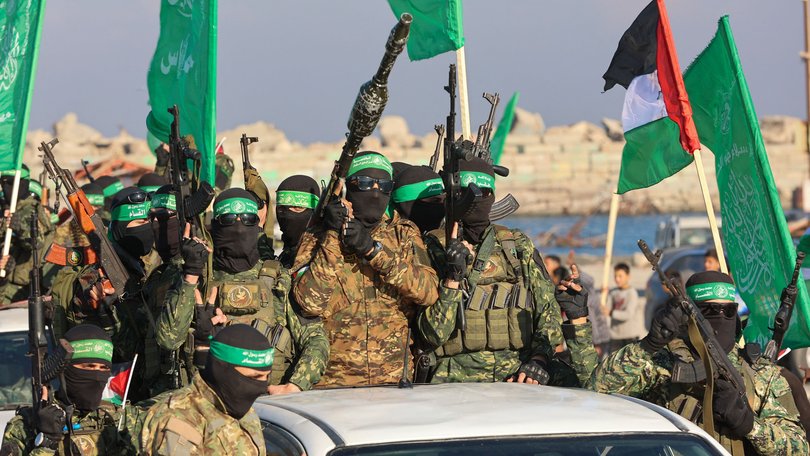Israel, Gaza war: Hamas accepts proposed deal for 60-day ceasefire
Hamas says it has accepted a new proposal for a ceasefire in Gaza, as the world awaits Israel's response.

Hamas has accepted the latest proposal for a 60-day ceasefire with Israel that includes the return of half the hostages the group holds in Gaza and Israel’s release of some Palestinian prisoners, an Egyptian official source says.
Senior Hamas official Basem Naim wrote on Facebook: “The movement has handed over its approval to the new proposal presented by the mediators”.
There was no immediate response from Israel.
Sign up to The Nightly's newsletters.
Get the first look at the digital newspaper, curated daily stories and breaking headlines delivered to your inbox.
By continuing you agree to our Terms and Privacy Policy.The Egyptian official source said the latest proposal included a suspension of Israeli military operations for 60 days and a path to a comprehensive deal to end the nearly two-year war.
A source familiar with the matter said the proposal was nearly identical to one put forward previously by US special envoy Steve Witkoff, which Israel had accepted.
Israel’s plans to seize control of Gaza City have stirred alarm abroad and at home, where tens of thousands of Israelis on Sunday held some of the largest protests since the war began.
They took to the streets, urging a deal to end the fighting and free the remaining 50 hostages held in Gaza since the Hamas attack on October 7, 2023. Israeli officials believe 20 are alive.
The planned offensive has spurred Egyptian and Qatari ceasefire mediators to step up efforts to forge a deal.
Thousands of Palestinians, fearing an imminent Israeli ground offensive, have left their homes in eastern areas of Gaza City, now under constant Israeli bombardment, for points to the west and south in the shattered territory.
Israeli Prime Minister Benjamin Netanyahu has described Gaza City as Hamas’ last big urban bastion.
But, with Israel already holding 75 per cent of Gaza, the military has warned that expanding the offensive could endanger hostages still alive and draw troops into protracted and deadly guerrilla warfare.
Dani Miran, whose son Omri was taken hostage on October 7, said he feared the consequences of an Israeli ground offensive in Gaza City.
“I’m scared that my son would be hurt,” he told Reuters in Tel Aviv on Monday.
In Gaza City, many Palestinians have also been calling for protests to demand an end to a war that has demolished much of the territory and wrought a humanitarian disaster, and for Hamas to intensify talks to avert the Israeli ground offensive.
An Israeli armoured incursion into Gaza City could displace hundreds of thousands of people, many of whom have been uprooted multiple times during the war.
Ahmed Mheisen, Palestinian shelter manager in Beit Lahiya, a war-devastated suburb abutting eastern Gaza City, said 995 families had departed the area in recent days for the south.
With the Israeli offensive looming, Mheisen put the number of tents needed for emergency shelter at 1.5 million, saying Israel had allowed only 120,000 tents into the territory during a January-March ceasefire.
The UN humanitarian office said last week 1.35 million people were already in need of emergency shelter items in Gaza.
“I am heading south because I need to ease my mental state,” Mousa Obaid, a Gaza City resident, told Reuters.
“I do not want to keep moving left and right endlessly. There is no life left, and as you can see, living conditions are hard, prices are high, and we have been without work for over a year and a half.”
The last round of indirect ceasefire talks ended in deadlock in late July, with the sides trading blame for its collapse.
Israel says it will agree to cease hostilities if all the hostages are released and Hamas lays down its arms - the latter demand publicly rejected by the Islamist group until a Palestinian state is established.
A Hamas official told Reuters earlier on Monday that the group rejects Israeli demands to disarm or expel its leaders from Gaza.
